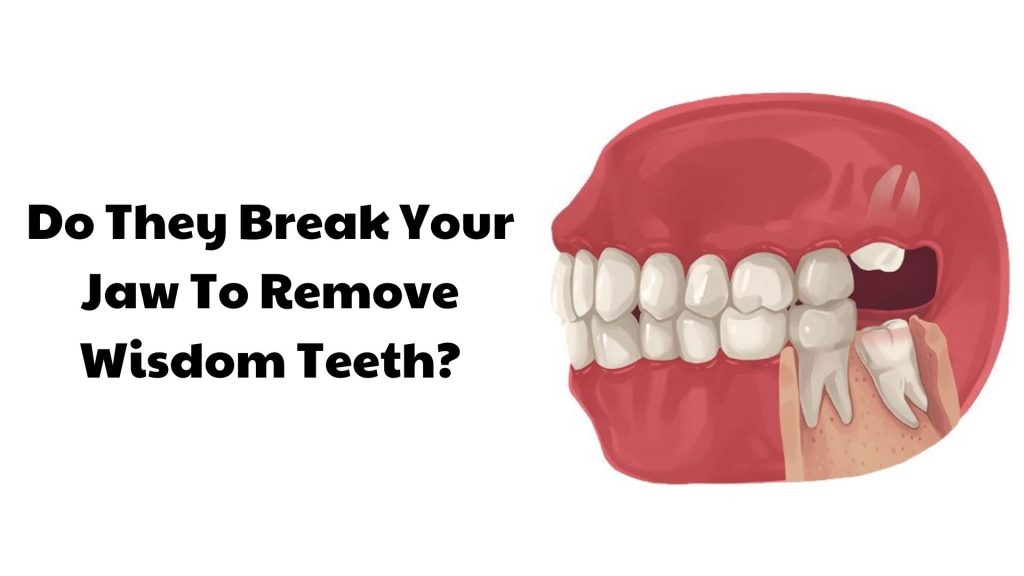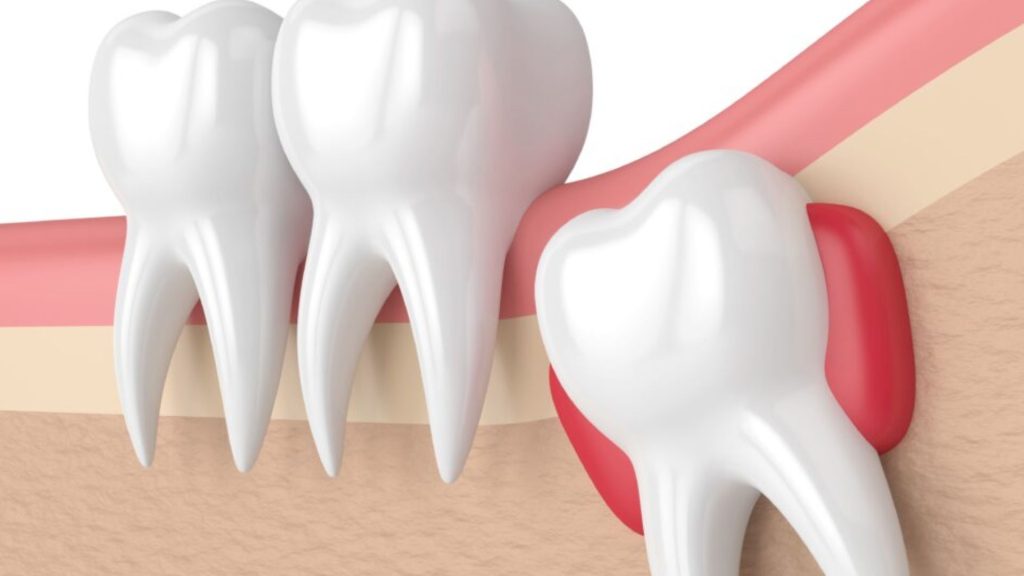Do they break your jaw to remove wisdom teeth? No, wisdom teeth removal does not involve fracturing the jaw. Most of the time, a cut has to be made in the gum tissue to get to the affected wisdom tooth. To facilitate tooth extraction, a tiny piece of bone may be removed. This is not jawbreaking.
Keep reading to know more!
Do They Break Your Jaw To Remove Wisdom Teeth?


Usually, you don’t need to break the mouth to get rid of wisdom teeth. In rare situations, wisdom teeth locked deep in the jawbone might be cracked. The choice to break the jaw relies on the position, alignment, and health of the wisdom teeth as well as the dentist’s skill and experience. If your wisdom teeth were taken out with regular surgery, without breaking your jaw, the process will focus on taking out gum tissue and teeth. In complex circumstances, a dentist may need to remove the jawbone to extract wisdom teeth.
Is Wisdom Teeth Extraction Permanent Jawbone Deformity?
In some cases, taking out a wisdom tooth can cause a small and brief change in the jawbone. However, these anomalies are usually transient and the bone will repair and adapt. After the wisdom teeth are taken out, there will be a hole in the jawbone. Surgery may alter this space’s bone. Possible examples of distortion include:
- Swelling: After the wisdom teeth removal, bone and soft tissue may bulge. This is typical and should lessen within a few days or weeks following surgery.
- Bone loss: To remove the wisdom tooth, a tiny amount of bone may be removed. But the jawbone can heal and change on its own after this happens.
- Temporary deformity: When wisdom teeth are taken out, the jawbone can sometimes briefly change shape. However, the bone will heal and revert to its natural form.
Other Wisdom Teeth Removal Issues


Based on The British Association of Oral and Maxillofacial Surgeons, some problems can also happen when a wisdom tooth is pulled. Here are some other problems you might have after having your wisdom teeth taken out:
- Infection: Bacteria may contaminate the incision. This may cause surgery site edema, discomfort, and pus. Postoperative treatment, such as oral hygiene and medicines, may lower infection risk.
- Bleeding: Post-surgery bleeding is normal, but if it lasts or is excessive, then call your doctor.
- Temporary or Permanent Nerve Deficiency: This can cause numbness, loss of feeling, or movement of soft tissue or the face area.
- Bleeding pocket formation: Blood-filled tissue around the surgery site is called a bleeding sac. Unremoved bleeding bags may cause discomfort and irritation. If it is necessary, the doctor can do the operation to remove the blood bag.
Not all wisdom teeth extractions have the same difficulties and outcomes. Most wisdom teeth extractions go well. However, wisdom teeth extraction is a surgical procedure, so it’s wise to talk to your dentist about probable issues and how to maximize recovery.
Wisdom Teeth Extraction In Bassendean
Many people have doubts and inquiries concerning wisdom teeth being removed prior to really having it done. When wisdom teeth are taken out, it can cause problems and be upsetting. However, a professional wisdom teeth extraction is safe and successful. To assist you in comprehending and calm your fears, we’ll describe a typical wisdom teeth extraction:
Examination And Diagnosis
The first step is an initial checkup and evaluation. During this step, your dentist will look at your wisdom teeth to see how they are doing. Next, the dentist will accurately analyze the wisdom teeth’s location, orientation, and condition through clinical examination and dental X-rays.
Choosing A Surgical Method
The dentist will pick the best way to take out your wisdom teeth based on how you were first evaluated. In most situations, wisdom teeth may be removed by removing gum tissue and teeth. But in more complex cases, surgery may be needed to widen the jawbone or take it out.
Anesthesia And Surgery
Before removing your wisdom teeth, your dentist will give you either local or general anesthesia to make sure you don’t feel any pain. Following the chosen approach, the dentist will remove the wisdom teeth.
Post-surgery Recovery
After the wisdom tooth is taken out, the dentist will tell you how to take care of yourself. This involves taking painkillers, controlling bleeding with bandages, eating a soft diet, and avoiding stressful activities.
Follow-up And Check-Ups
After taking out your wisdom teeth, the dentist will set up a follow-up visit to check on your healing and make sure there are no problems.
In short, a dentist needs to be professional and skilled to take out a wisdom tooth. Safe and effective wisdom teeth extraction is possible with proper preoperative planning and follow-up treatment.
Post-Extraction Dental Advice
Dentists often give important tips to help people heal from having their wisdom teeth taken out and avoid problems. Here are some common tips after taking out a wisdom tooth:
- Apply cold: Use an ice pack for 15 minutes on the surgery site for the first 24–48 hours following wisdom teeth extraction to decrease swelling and discomfort. After surgery, repeat this technique every hour.
- Limit activity: Avoid sprinting, leaping, bending, or tilting the head, which might put pressure on the surgery site. Preventing bleeding and promoting health.
- Adhere to the diet: In the first few days after getting your wisdom teeth out, you shouldn’t eat too many hard, hot, or spicy foods. Instead, choose soft, cold, and healthy foods to keep the surgery site from getting hurt and to speed up the wisdom teeth recovery process.
Conclusion
When it comes to removing wisdom teeth, the question “Does the jaw have to be broken to remove wisdom teeth?” makes people nervous, so they try to find a dentist they can trust. For patients in need of wisdom teeth removal, Spring Orchid Dental Clinic has pioneered a new, non-invasive procedure that eliminates the need for a jaw fracture. Here at Spring Orchid Dental, we want your wisdom teeth extraction to be as painless and stress-free as possible. This team of dental specialists will carefully and precisely remove wisdom teeth.
Also, we recognize that wisdom teeth extraction might cause worry and stress. Therefore, we provide a pleasant and comfortable atmosphere for you to feel protected and confident. From start to end, our medical staff will keep you informed and provide attentive care.
FAQs
What Happens To Your Jaw During Wisdom Teeth Surgery?
During the treatment of wisdom teeth, the jaw goes through a number of changes and processes. Here’s what usually happens to your jaw when you get your wisdom teeth out:
- Anesthesia: To keep you comfortable throughout surgery, you’ll get anesthetic before it starts. Local and general anesthesia is employed.
- Incision and Access: The oral surgeon will cut the gum tissue to reach the impacted wisdom teeth under anesthetic. To improve access, a tiny portion of the bone around the tooth may be removed.
- Tooth Extraction: Depending on its location and health, the tooth might be removed whole or in pieces. The oral surgeon will use special tools to gently remove the tooth from the socket.
- Bone Reshaping (If Necessary): If the wisdom teeth are affected or create problems, the surrounding bone may be reshaped or removed. This ensures full tooth removal and a smooth healing surface.
- Healing and Bone Regeneration: After surgery, your jaw will recover. The jawbone will naturally fill the tooth gap. Bone regeneration will restore the jaw’s native structure.
How Do They Maintain Your Mouth Open When Removing Wisdom Teeth?
The oral surgeon wants your jaw open to see the operation location and remove wisdom teeth. A mouth support or retractor keeps your jaw open throughout the surgery. It works like this:
- Mouth Prop.
- Mouth Retractor.
In addition, local anesthetics or sedation may assist in relaxing your jaw muscles during surgery, which will make it simpler for you to maintain your mouth open for the required length of time. So, always check with your oral surgeon about the methods and tools they employ to maintain your mouth open during wisdom teeth removal.
When Is It Too Late To Remove Wisdom Teeth?
When to get your wisdom teeth out can depend on your own situation. In most cases, it is best to get your wisdom teeth taken out before they cause problems. There’s no “too late” age to remove wisdom teeth. Wisdom teeth usually come in between 17 and 25 years old, but they can come in earlier or later, or not at all. Factors such as wisdom tooth alignment, location, influence on adjoining teeth, and potential for future issues are often taken into account before making the choice to extract them.





